Starting an HVAC business needs good planning and looking ahead to make sure it does well over time in a tough and changing market. A good business plan is like a roadmap for how the company will run, grow, and stay successful.
In the HVAC industry, companies face several challenges like changes in demand, following rules and regulations, and providing great customer service. The business plan shows the important components needed to start and grow an HVAC company.
It includes looking into the market, planning finances, creating marketing ideas, setting goals for operations, and figuring out staffing needs. It’s important to know what customers want, what other businesses are doing, and what is happening in the industry to be successful.
With a good HVAC business plan, you handle problems in the industry, create strong bonds with customers, and get more profit. This post will tell how you can reach your business goals and keep your company recognized as a reliable HVAC provider.
Why is a Strategic HVAC Business Plan Important?
The HVAC industry in the United States is doing very well. It’s expected to be worth over $130 billion in 2025, growing at a rate of 5.6% each year. Starting an HVAC business can be a great chance for new entrepreneurs, but doing it without a good plan can end up being a big mistake and cost a lot of money.
Statistics reveal that almost 80% of new HVAC businesses do not succeed within their first five years according to U.S. Small Business Administration. What makes successful HVAC businesses different from those that have a hard time?
A good HVAC business plan. It acts like a guide for owners to plan their money, improve their operations, and use the best marketing methods to make more profit. By using a good plan for starting your HVAC business, you can build a successful and growing company while steering clear of common mistakes.
Why Do You Need a Business Plan for Your HVAC Startup?
A good HVAC business plan is not just a bunch of papers; it shows your company the right path to follow. Here’s how it can help make money over a long time:
- Helps Get Funding: Investors and banks want a clear plan for your HVAC startup before they give you loans or business credit.
- Finds Profit Margins: A clear financial plan helps you watch your expenses, set good prices, and increase your profits.
- Prepares for Market Challenges: By studying local competitors and looking at industry trends, you can set your HVAC business up for success.
- Improves Business Operations: A business plan helps with organizing schedules, managing staff, and getting new customers.
If HVAC business owners don’t have a good plan, they might not price their services correctly, spend too much on advertising, and have money problems, which can result in failure.
United States Overview of the HVAC Industry (2025)
| Metric | Value |
| Market Size | Over $130 billion |
| Yearly Growth Rate (CAGR) | 5.6% |
| Startup Failure Rate | About 80% in five years |
| Average Profit Margin | 10-20% |
| Need for HVAC Technicians | Predicted to increase by 13% by 2028 |
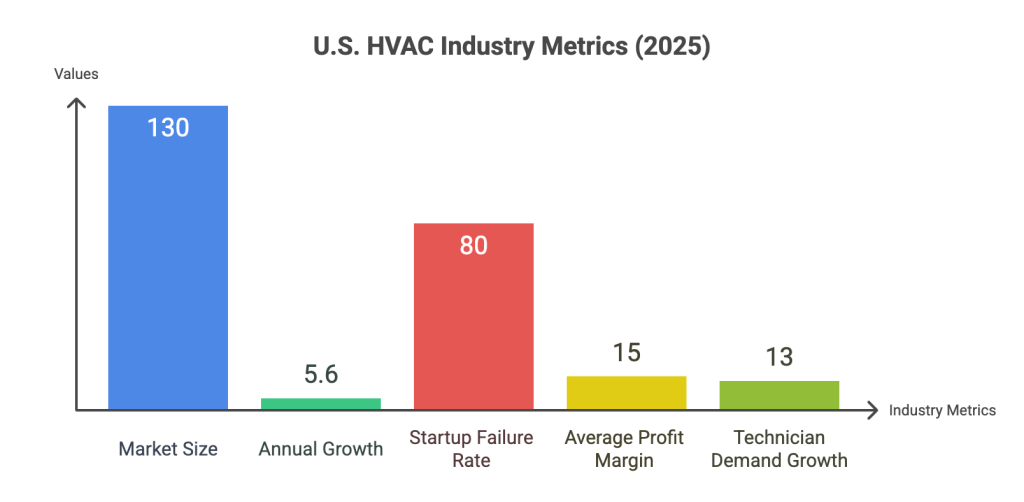
Industry Review: HVAC Market Patterns and Profits in 2025
Before starting a business, you should learn about the current trends in the HVAC industry, what makes the business profitable, and who your competitors are. The HVAC industry is changing. New ideas about using energy better, smart technology, and new rules are affecting how the market works.
Main Trends in the HVAC Industry
- Increase in Energy-Saving HVAC Systems
The government is promoting sustainability, and there is a strong need for energy-saving HVAC systems. Homeowners and businesses are getting energy-saving HVAC systems to lower their energy costs.
Companies that work on eco-friendly solutions will have an edge over others. Customers are willing to pay 10-20% extra for eco-friendly HVAC systems, so businesses can charge fairly for their HVAC services and still make a profit. - Smart HVAC Technology and Internet of Things (IoT) Integration
More people are using smart thermostats, IoT-integrated systems, and AI technology for checking and fixing problems. By 2025, more than 75% of new HVAC systems will have smart technology. This creates many chances for companies that install and fix these systems. - HVAC Maintenance Plans Demand
Customers are moving to long-term service agreements instead of just getting repairs done once. Providing regular HVAC maintenance services through subscriptions can create a steady and reliable income. - Changes to HVAC Regulations
Government rules about using environmentally friendly refrigerants (like stopping R-410A) and energy-saving HVAC systems are changing the industry. Companies that follow the rules properly will avoid fines and gain more trust from their customers.
Profit Breakdown: How Much Can You Make in HVAC?
| Type of VAC Business | Yearly Income Potential ($) | Profit Margin (%) |
| Residential | 100K-1M | 10-15 |
| Commercial | 500K-5M | 15-25 |
| Industrial | 1M-10M | 20-30 |
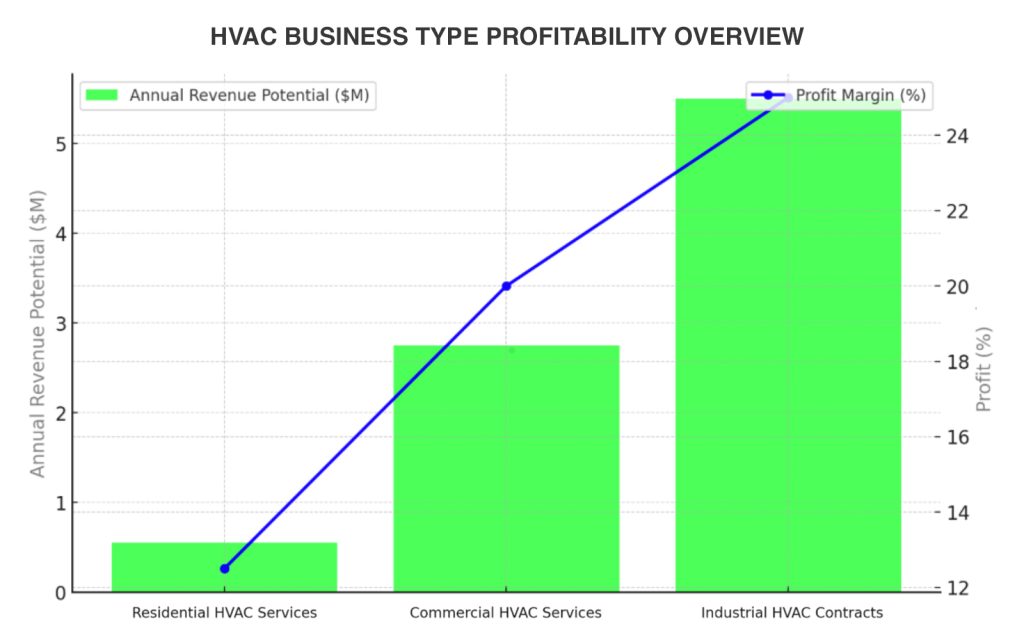
How to Get More Profit in Your HVAC Business?
- Put money into SEO for HVAC contractors to get higher rankings on Google and bring in more customers.
- Sell HVAC maintenance contracts to make steady money over time.
- Concentrate on Local SEO for HVAC contractors in [City] to be at the top of local search results.
- Team up with a budget-friendly HVAC SEO company to get more leads.
By taking advantage of these market trends and chances to make money, your HVAC business plan can be set up for lasting success. Before starting a successful HVAC business, it is important to do careful research on the market.
If you don’t know your target customers, your competitors, and what people want in the HVAC market, your business plan might not attract enough customers. A good HVAC startup plan helps you make your business successful.
It also helps meet what customers want, and do better than other HVAC companies. A great way to get more local customers is to understand that your HVAC business needs a good Google My Business profile. This helps you show up better in search results.
Target Market: Residential vs Commercial Clients
| Factor | Residential | Commercial |
| Type of Customer | Homeowners and Property Owners | Business Owners and Property Managers |
| Need for Services | Seasonal, Repair & Installation | Maintenance contracts for all year round |
| Average Job Cost | $1,500 to $10,000/job | $5,000 to $100,000/contract |
| Profit Margins | 10-15% | 15-30% |
How to Find Out What HVAC Services People Need Locally?
To find the best way to start an HVAC business, look at local search trends and what people want.
- Use keyword research tools to find out how many people are searching for phrases like “HVAC business near me” and “HVAC installation services in [City]”.
- Look at real estate trends, cities that are growing quickly need more HVAC system installation and maintenance.
- Look at weather trends, extreme weather increases the need for HVAC systems.
- Check industry reports, like IBISWorld, to see how businesses are growing in your area.
How to Do Better than Your Competitors?
After you know who your audience is, it’s important to look at what your competitors are doing and see where they are missing opportunities in their HVAC business plan.
- Look for the best HVAC companies near you on Google.
- Look at their prices, services, and what customers say about them.
- Find out how they market their business, including their SEO for HVAC contractors.
SWOT Analysis of a New HVAC Business
| Factor | Strengths | Weaknesses | Opportunities | Threats |
| Pricing | Adjustable Prices | High Starting Costs | Can Provide Great Offers | Bigger Competitors Offer Discounts |
| Brand Awareness | New and Different Brand | Less Presence Online | SEO and Local Advertising | Big HVAC Companies Control the Market |
| Customer Retention | Custom Service | Limited Client Base | Subscription Plans | Long Term Contracts from Competitors |
Effective Ways to Get Ahead of Competition
- Use Local SEO for HVAC contractors in [City] to beat competitors on Google Search and Maps.
- Provide payment plans for HVAC installations to attract more customers.
- Use online marketing methods like social media, paid ads, and a good website to get potential customers.
- Make your services stand out by providing energy-saving HVAC systems and smart HVAC installations.
- Get an affordable HVAC SEO agency to help you improve your position online and bring in regular customers.
Money Management: Making a Budget and Estimating Profits
One of the biggest problems HVAC startups have is handling money poorly. Many HVAC business owners do not realize how much money they need to start their business, set prices, and run day-to-day operations.
This can cause money problems later on. A clear financial plan is an important part of a successful HVAC business plan. To save money at first, team up with a budget-friendly HVAC SEO agency instead of hiring a marketing team to work in your company.
Breakdown of HVAC Startup Costs
Before starting your HVAC business, carefully figure out how much money you need to get started. The price depends on things like where the business is, what services it provides, and the fees for licenses.
| Type of Expense | Cost Estimate ($) |
| HVAC Tools and Equipment | 20,000 to 50,000 |
| Licenses and Insurance | 5,000 to 15,000 |
| SEO & Marketing | 5,000 to 10,000 |
| Office Setup and Storage | 10,000 to 30,000 |
| Company Vehicle and Gas | 15,000 to 50,000 |
| Starting Employee Salaries | 20,000 to 50,000 |
| Estimated Overall Cost | 75,000 to 205,000 |
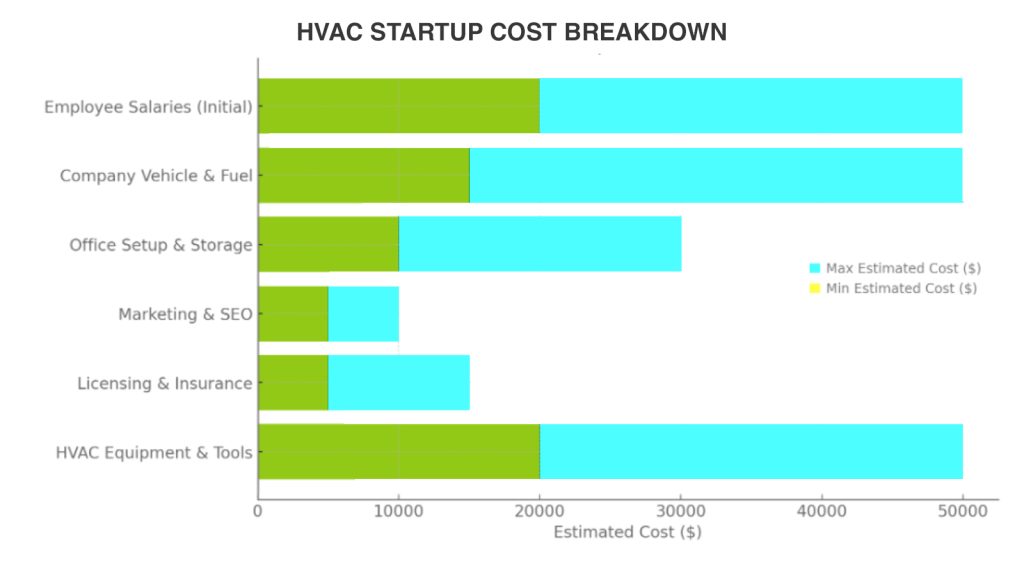
How to Set Your HVAC Service Prices for the Most Profit?
Cost-Based Pricing
Add up all the costs for materials, work, and extra expenses, then include a profit amount on top of that.
- AC installation cost: $2,000
- Labor cost: $500
- Extra costs: $300
- Total cost: $2,800
- Final price (after adding 40%): $3,920
Value-Based Pricing
Charge customers according to how valuable they think your service is.
- Smart HVAC systems can cost more because they offer extra convenience.
- Eco-friendly HVAC systems cost more because they save energy.
Competitive Pricing
Look at what nearby businesses are charging and set your prices a bit lower or give extra perks to draw in customers.
| Type of Service | Average Cost of Competitors ($) | Your Price Suggestion ($) |
| AC installation | 3,500 | 3400 (first service free) |
| HVAC Maintenance | 150-500 | 140-480 |
| Annual Maintenance | 200-600 | 180-550 |
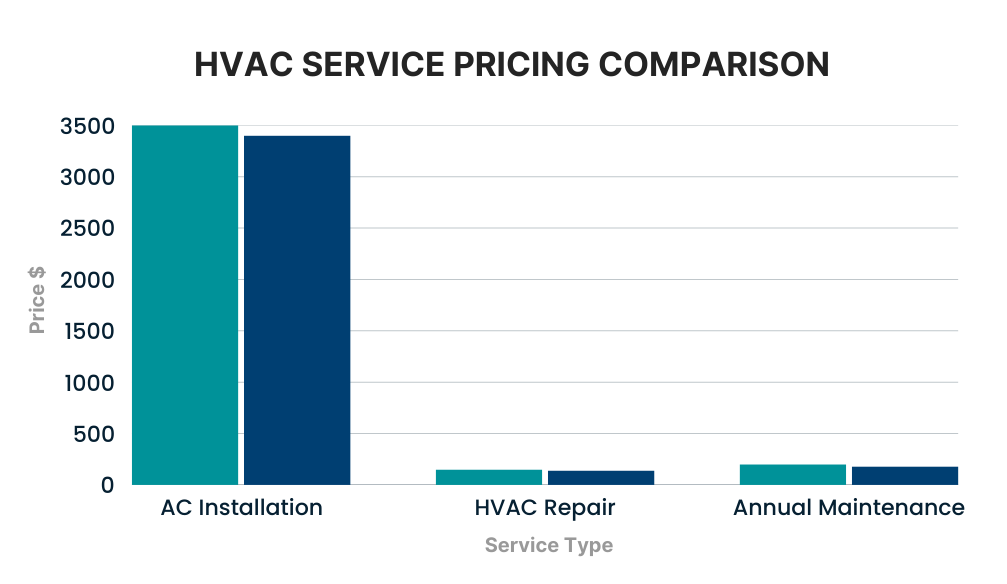
Predicting Income: How Much Can You Earn From Your HVAC Business?
Profitability relies on how much people want the service, how prices are set, and who the customers are.
Break-even Analysis
The break-even point is when the money you make is enough to pay all your business costs. If you spend $100,000 to start your business, and you make $500 profit for each HVAC job you do, you will need:
- You need 200 HVAC jobs to get back your starting investment.
- If you do 10 jobs each week, it will take about 20 weeks (or about 5 months) to cover your costs.
How to Get More Profit?
- Improve your Google ranking with SEO for HVAC contractors to get more local customers.
- Provide HVAC maintenance services for regular income.
- Save money by improving delivery routes and using online billing software.
Common Financial Mistakes to Avoid
- Setting low prices for services can bring in more customers, but it can hurt overall profits in the long run.
- If you don’t do marketing, like local SEO for HVAC contractors, people won’t be able to find your business.
- Make sure to save money for the slower months of the year when business might be low.
Legal Considerations: HVAC Licenses, Insurance, and Regulations
Starting an HVAC business means you must follow important laws and get the right licenses and insurance. If you don’t have the right certifications and follow the rules, your HVAC business plan could run into legal problems, incur fines, or get delayed.
A good plan for starting an HVAC business should cover the licensing rules for HVAC systems in your state, what kind of insurance you need, and the industry rules you have to follow.
HVAC License Requirements in Each U.S State
Each U.S. state has its own rules for licensing HVAC contractors. Some jobs need formal training and certificates, while others require an apprenticeship before you can get a license.
| U.S. State | License Requirement | Additional Certifications |
| California | HVAC Contractor License (C-20) | EPA Section 608 |
| Texas | Texas Air Conditioning License (TACL) | NATE Certification |
| Florida | HVAC Contractor License (Class A/B) | OSHA Safety Training |
| New York | No state license needed, but you need permits from local county | EPA 608 Certification |
| Illinois | You need an HVAC license in some cities, like Chicago | Refrigeration Certification |
How to Get an HVAC License?
Finish an HVAC training program: Sign up for a recognized HVAC certification course.
Get practical experience: Most states want you to have 2-5 years of work experience before they give you a license.
Take a licensing exam: The exam usually tests your knowledge of HVAC installation, repair, safety rules, and local regulations.
Get EPA certification: If you work with refrigerants, you need to have an EPA 608 certification.
Apply for your state license: Send the required papers and pay the fees.
Important Insurance Policies for HVAC Businesses
To safeguard your HVAC business, you need full insurance protection. This protects you from lawsuits, damage to machines, and injuries to workers. If an HVAC business doesn’t have the right insurance, it could lose money from accidents, lawsuits, or damage to property.
| Type of Insurance | Provided Coverage |
| General Liability | Helps prevent damage to property and injuries from HVAC work |
| Workers’ Compensation | Pays for workers’ medical bills and lost pay if they get hurt on the job |
| Professional Liability | It includes legal claims because of bad HVAC installations |
| Commercial Auto | Coverage for accidents and damage to HVAC vehicles |
| Business Property | Protects against damage to HVAC tools, office space, and equipment |
Creating Your HVAC Business Plan: Choosing a Niche
The HVAC industry has various ways to run a business, and each way can make different amounts of money. Picking the right model to run an HVAC business helps it make money over time.
How to Choose the Best HVAC Niche?
Assess Local Needs: If there are a lot of commercial buildings in your city, providing HVAC services for them could make you the most money.
Check the Competition: If there are too many HVAC services for homes, think about offering special HVAC options, like smart HVAC systems.
Consider Your Budget: Industrial HVAC contracts can make a lot of money, but you need more money to get started.
Use SEO Strategies: By targeting Local SEO for HVAC Contractors in [City], you can take the lead in local search results.
Digital Marketing Ideas to Help HVAC Businesses Grow
A good HVAC business plan needs a strong digital marketing strategy to be complete. Many HVAC companies depend on recommendations from friends and family, but in 2025, online marketing is the best way to get new customers.
SEO for HVAC contractors, improving local search results, paid advertising, and content marketing can really help you get noticed and increase your income.
Why do HVAC Companies Need SEO and Digital Marketing?
- 97% of people look for local businesses online before they decide to buy something.
- Google ranks HVAC companies based on how relevant their website is, how well they use Google My Business, and the reviews from customers.
- Paid ads (PPC) get results quicker than regular search results, but you need to keep spending money on them.
HVAC SEO: How to Get a Better Ranking on Google?
Investing in SEO for HVAC contractors helps your business show up on the first page of Google when people search for HVAC repair, installation, or maintenance services.
HVAC SEO Tips
- Local SEO for HVAC Contractors in [City]: Improve your GMB profile to rank better in local searches.
- On-Page SEO: Include important HVAC words in your page titles, descriptions, and text. Content Marketing: Write helpful blogs, like “How to Repair a Leaking Pipe?”, to draw in customers.
- Link Building: Get links from home improvement listings and local business sites.
- Mobile Optimization: Make sure your HVAC website works well on phones since 65% of local searches are done on mobile devices.
PPC Ads for HVAC Companies
SEO takes a while to show results, but PPC advertising gives you quick visibility. Google Ads and Facebook Ads help HVAC companies reach specific customers nearby.
Example Plan for a PPC Campaign:
- Google Ads Keywords: “Emergency heater repair near me,” “RO installation in [city],” “Top HVAC services”.
- Budget: $500 to $3,000 each month.
- Target Audience: People who own homes, manage properties, or run businesses.
- Expected Conversion Rate: 5-10% on average.
PPC vs SEO Leads for Every $1000 Spent
| Marketing Plan | Leads Made per $1000 |
| SEO | 30 |
| Google Ads | 50 |
| Facebook Ads | 20 |
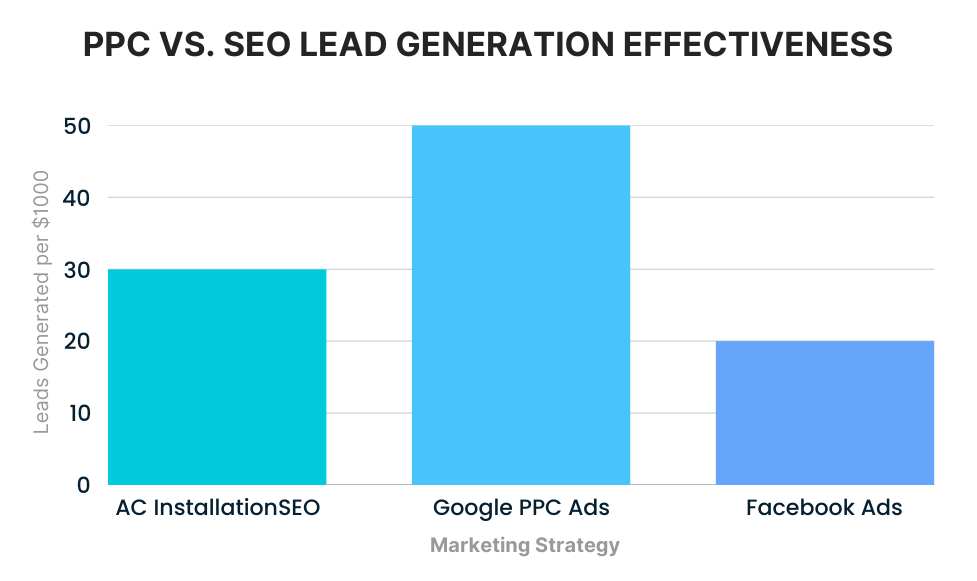
Streamlining Processes for Better Efficiency
After your HVAC business starts, it’s important to run things smoothly to keep making money and keep your customers happy. Using the right HVAC management software, automating tasks, and improving how you run your fleet can help your business grow more quickly.
Using Software for Managing HVAC Businesses
Buying HVAC management software can assist with:
Scheduling & Dispatching: Give jobs to workers quickly and smoothly.
Automated Invoicing and Payments: Cut down on mistakes in billing.
CRM: Keep a record of customer information and past interactions.
Fleet and Technician Tracking: Improve routes for timely service.
| HVAC Software | Features | Best For |
| ServiceTitan | Scheduling, Payments, Customer Management | Large Businesses |
| Housecall Pro | Job Automation, Processing Payments | Small and Medium Businesses |
| Jobber | Invoicing, Quote Management | Independent HVAC Contractors |
Route Optimization and Fleet Management
Fleet costs can account for 15-25% of an HVAC company’s budget. Cutting fuel costs and better planning of work can help make more money.
- Use GPS to send workers to the closest job location.
- Cut down on waiting time by planning service routes better.
- Take care of HVAC service vehicles to stop them from breaking down and causing delays in work.
How to Cut Extra Costs Without Decreasing Service Quality?
Having an HVAC business means you have costs, but good planning can reduce these costs while still providing good service. By making HVAC systems work better, companies can make customers happier, work more efficiently, and earn more money.
Strategies to Lower Costs
- Automate customer communication: Use chatbots and text message reminders.
- Invest in preventive maintenance contracts:They help keep your money steady.
- Bulk purchase equipment: Get lower prices on HVAC parts.
Customer Retention: Getting More Repeat Business and Growing Over Time
Many HVAC companies concentrate on getting new customers, but retaining current ones is better for making money. Research shows that if you can retain just 5% more customers, your profits can go up by 25-95%. A good HVAC business plan should have ideas for keeping customers so the business can grow for a long time.
Why Retaining Customers is More Profitable than Getting New Ones?
Getting a new customer costs 5 to 7 times more than retaining a current one. Customers who have used your HVAC services before are more likely to:
- Hired you for future fixing or repair tasks.
- Buy service contracts for regular maintenance.
- Tell their friends and family about your business.
Cost Comparison – Customer Retention vs Acquisition
| Factor | Customer Retention | Customer Acquisition |
| Marketing Expenses | Low | High |
| Conversion Rate | High (60-70%) | Low (5-20%) |
| Revenue Potential | Recurring | One-time |
| Investment in Time | Low | High |
Rather than just trying to get new customers, focus on retaining the ones you already have by creating loyalty programs and checking in with them regularly.
Cost per Retained Customer vs New Customer
| Year | Customer Retention ($) | Customer Acquisition ($) |
| 2020 | 250 | 1000 |
| 2021 | 260 | 1100 |
| 2022 | 270 | 1200 |
| 2023 | 280 | 1300 |
| 2024 | 290 | 1400 |
HVAC Maintenance Contracts
One of the best ways to keep customers coming back is by giving them HVAC maintenance contracts. These help you make regular money and offer customers routine check-ups and quicker service.
Advantages of HVAC Maintenance Plans
- Reliable income: Customers pay a set amount each month or each year for ongoing service.
- Higher customer lifetime value: Customers keep coming back to your brand.
- Less emergency repairs: Keeping up with regular maintenance helps avoid system breakdowns.
How to Start an HVAC Maintenance Program?
- Provide different types of contracts: Basic, Standard, and Premium.
- Offer special advantages (faster service, lower prices, longer warranties).
- Promote your business using emails and pop-up messages on your website.
A company has three HVAC maintenance plans: Basic for $99 a year, Standard for $199 a year, and Premium for $399 a year get 30% more customers coming back.
Handling Online Reviews and Reputation
How people see you online is very important for retaining customers and growing your business. 88% of customers believe online reviews are as trustworthy as recommendations from friends or family.
How to Get More Good Reviews for Your HVAC Business?
- Ask satisfied customers to give reviews on Yelp and Google.
- Send a text or email to customers with a link for leaving a review.
- Fix negative feedback quickly to maintain trust.
By concentrating on retaining your customers, having maintenance plans, and managing your online reputation, your HVAC business will grow naturally and make money.
Common Startup Mistakes to Avoid in HVAC
Overpricing or Underpricing Services
Setting the right prices is very important for any HVAC business. Setting prices too low can bring in customers at first, but it usually results in low profits, and the business may have trouble paying for its expenses over time.
On the other hand, charging too much can scare away possible customers, especially in crowded markets. It’s important to do research about the market, know what local competitors are doing, and set prices that match the quality of your service.
Many new businesses forget to include costs like rent, employee wages, and equipment when figuring out their prices, which can cause problems. Regularly checking prices and changing them based on market trends or seasonal demand will help keep the business competitive and profitable.
Pricing Strategy: Industry vs Recommended
| Service | Industry Average ($) | Recommended ($) |
| AC Installation | 3500-5500 | 3800-5200 |
| Maintenance | 100-500 | 120-450 |
| Emergency Repair | 150-700 | 180-650 |
Not Performing Digital Marketing and SEO
Many new startups make the mistake of only using old-fashioned marketing, which can reduce how many people see them and know about them. If a business doesn’t have a good online presence, people might not discover it, even if it provides great services.
A good SEO plan helps the business show up in search results locally when people are looking for HVAC services. This can make a big difference because many people use search engines to look for service providers.
Having an easy-to-use website, making good content, and regularly improving SEO can greatly boost your online presence and bring in more customers. Also, creating a good online reputation with positive reviews, interacting on social media, and using targeted ads can help people notice your brand and trust it in the local area.
Not Focusing on Good Customer Service
Good customer service is very important for creating lasting relationships and getting customers to come back. Many new businesses pay too much attention to the technical side of what they do and forget that giving great customer service is really important.
If you provide bad service or don’t communicate well with customers, you may get bad reviews, lose customers, and hurt your reputation. It’s important to teach staff how to answer questions, respond quickly, and solve issues fast.
Giving each customer friendly and helpful service makes them want to come back and tell their friends about the business. Also, being clear about costs, getting back to customers quickly, and providing help after the service can set a startup apart from others.
Oversights in Legal and Compliance Rules
HVAC companies must follow important laws and rules to prevent expensive fines or disruptions in their work. Sadly, many new businesses ignore the need to follow rules and regulations when they start up.
Not getting the right licenses, permits, or insurance can lead to big legal problems later on. HVAC companies also need to follow rules about buildings, the environment, and safety set by the federal government, state governments, and local authorities.
Not keeping up with new laws and rules can put a business at risk of legal problems and might lead to shutting down. To prevent these mistakes, it’s important to get legal advice, check the rules often, and make sure you have the right certificates and insurance.
Not Being Ready for Seasonal Fluctuations
The HVAC industry sees a lot of changes in demand depending on the season. It gets busy in the summer and winter but slows down in spring and fall. Many new businesses don’t prepare for these changes, which can cause problems.
Also, it’s important to have a plan for bringing in customers during slow times. Providing maintenance packages, discounts, or other services can help keep money coming in all year long. Changes in the seasons can affect how many workers a business needs.
To handle busy times, businesses should think about offering flexible work options or hiring temporary workers. This way, they can meet customer demand without having too many employees when things are slow.
Future Trends in the HVAC Field
The HVAC industry is evolving quickly, with new technology and rules affecting how companies work. A smart HVAC business plan should consider these trends to stay profitable and important in the market for a long time.
Energy-Saving HVAC Systems: The Future of Eco-Friendly Heating and Cooling
As people focus more on being environmentally friendly, energy-saving HVAC systems are becoming common. Government support and more people knowing about it are increasing the need for:
- High-SEER HVAC units that help save energy.
- Geothermal HVAC systems that use the heat from the earth to heat or cool buildings.
- Ductless mini-split systems that are energy-efficient and allow you to control the temperature in different areas separately.
The global market for energy-saving HVAC systems is expected to grow at a rate of 7.2% each year from 2025 to 2030, making it one of the quickest-growing areas. If your HVAC business provides energy-saving options, make sure to emphasize this in your online marketing and SEO.
IoT Integration and Smart HVAC Solutions
The growth of smart technology has made it possible to connect IoT (Internet of Things) to HVAC systems. Wi-Fi thermostats and smart diagnostics help homeowners and businesses track energy use and automatically control the temperature.
Incentives from the Government for Eco-Friendly HVAC Systems
Governments are encouraging businesses and homeowners to choose environmentally friendly HVAC systems by offering rewards, such as:
- Tax credits from the government for installing energy-saving HVAC systems.
- State incentives for companies that use eco-friendly HVAC systems.
- EPA rules requiring the removal of old refrigerants.
The Inflation Reduction Act (IRA) provides up to $2,000 in tax savings for installing energy-efficient heat pumps. If you promote energy-saving HVAC systems in your ads, you can attract customers who care about the environment and boost your sales.
Changing HVAC Rules and Phasing-Out Refrigerants
In 2025, new rules will affect HVAC companies:
- The replacement of R-410A refrigerant with better options that are kinder to the environment.
- Tighter rules for how energy-efficient new HVAC systems must be.
- Strict rules for commercial HVAC contractors.
HVAC business owners need to keep up with EPA rules and teach their technicians about new refrigerants and how to install them. By including these future trends in your HVAC business plan, you can make sure your business is eco-friendly, follows the rules, and grows over time.
Growth of Smart HVAC Technology (2020-2028)
| Year | Growth (%) |
| 2020 | 15 |
| 2021 | 20 |
| 2022 | 28 |
| 2023 | 35 |
| 2024 | 45 |
| 2025 | 55 |
| 2026 | 65 |
| 2027 | 75 |
| 2028 | 85 |
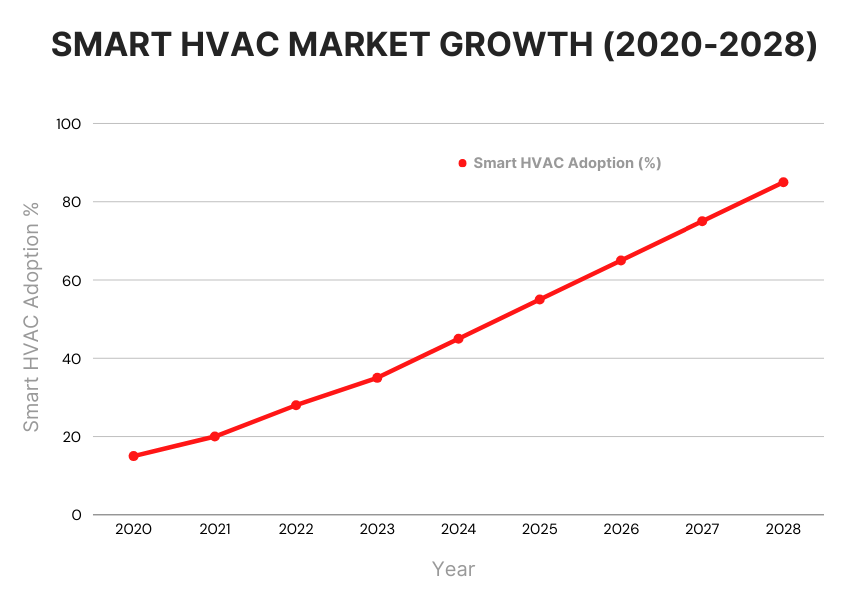
Final Thoughts
A clear and smart HVAC business plan is very important for the success and growth of any new business in this competitive field. Good planning helps a business keep up with changes in the industry, deal with seasonal ups and downs, and follow the laws and rules.
By focusing on important areas like understanding the market, setting good prices, providing excellent customer service, and running things smoothly, an HVAC company can create a strong base and stand out from the competition.
A good marketing and SEO plan increases visibility and helps bring in customers, making sure there is a steady demand for services. By paying attention to these important things, an HVAC business can build loyal customers, have good relationships, and make money.
FAQs
How to do market research for my HVAC business?
Begin by looking at the businesses near you that offer similar services. Find out what they provide, how much they charge, and what they do well or not so well. You can find information by looking online, checking out your competitors’ websites, and talking to customers nearby. Also, doing surveys or talking to potential customers can give useful information about what they want and what problems they face.
How should I set prices for my HVAC services?
Your prices must be balanced between affordable and premium services. Begin by looking into what nearby businesses charge and what services they provide at various prices. Consider all your costs, like workers’ pay, supplies, overhead, and shipping, to make sure your prices pay for everything and make a profit. Also, think about who your customers are; more expensive services may be worth higher prices, while people who are careful with their money might want cheaper options.
How can I make sure my HVAC business follows the law?
HVAC businesses have to follow different rules made by the federal, state, and local governments about safety, the environment, and getting permits to operate. First, get the right business permits and insurance to operate legally. HVAC workers usually need special certifications like EPA Section 608 to work with refrigerants. Keep up with building rules, safety guidelines, and environmental laws, especially when working on HVAC systems that use refrigerants or focus on saving energy.
What problems do people face when starting an HVAC business?
Starting an HVAC business has its own difficulties. One of the main challenges is competition because many well-known companies have a strong hold on local markets. Another problem is handling money, especially during slow times when fewer people want services. It can be hard to find skilled workers because there are not enough qualified people in the industry. Also, HVAC companies have to deal with rules and laws, safety guidelines, and keeping their licenses up to date.
How do I handle changes in HVAC needs throughout the year?
The HVAC business gets busier at certain times of the year. In the summer, more people need air conditioning services, while in the winter, more people need heating services. To handle these changes, we need to plan carefully. First, predict how many customers you’ll have each season and make sure you have enough staff and supplies to handle the busy times. During slow months, try to keep money coming in by providing maintenance services, checking air filters, or giving advice on saving energy.

